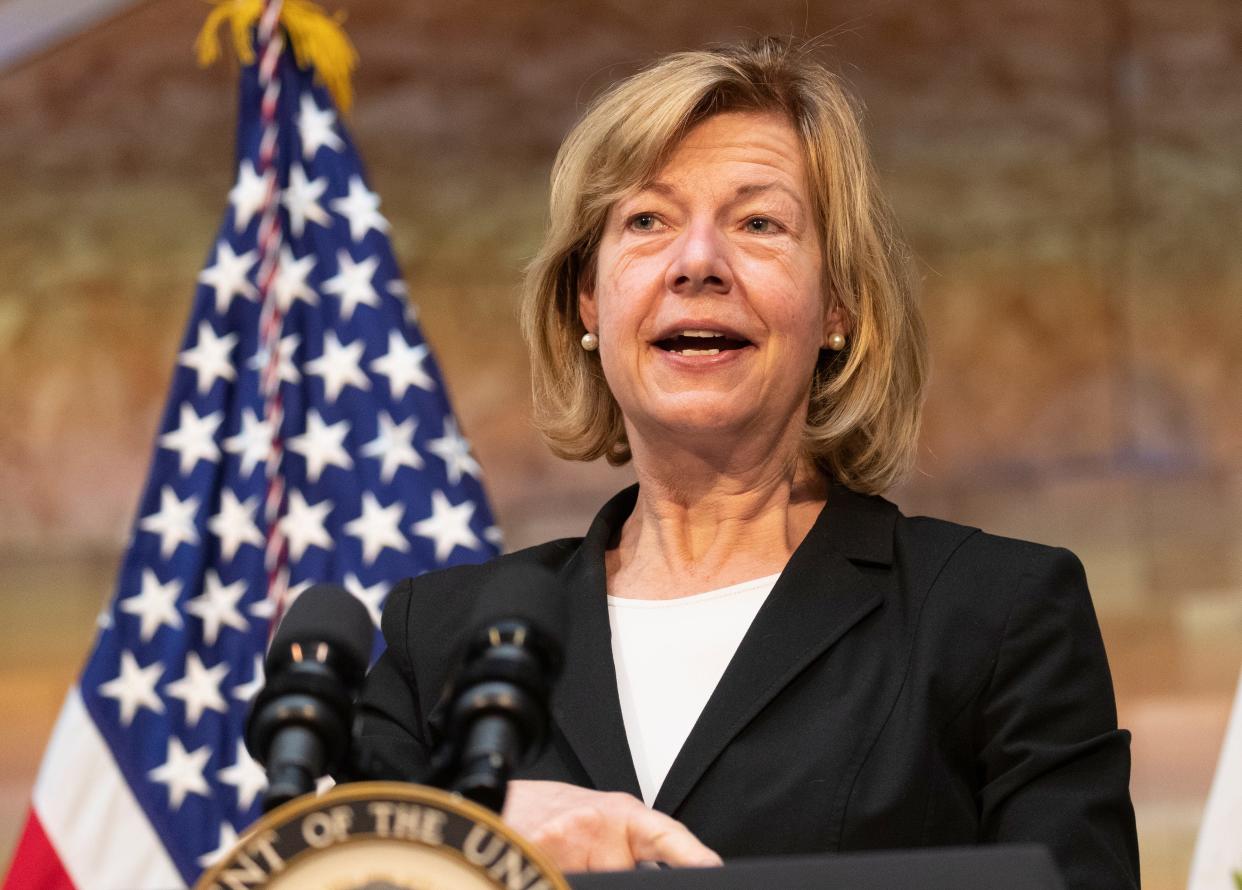Gilbert: What Wisconsin's 2024 landscape says about Tammy Baldwin's re-election chances

- Oops!Something went wrong.Please try again later.
- Oops!Something went wrong.Please try again later.
History shows it’s hard to beat an incumbent U.S. senator, even a vulnerable one.
In Wisconsin, senators seeking re-election are 8-1 over the last 30 years.
At this time two years ago, Republican Sen. Ron Johnson was getting some of the worst polling numbers of his career but still eked out a 1-point win.
Now Democratic Sen. Tammy Baldwin is up for re-election.

Her standing in the polls is much better than Johnson’s.
But she faces a political challenge that Johnson has never faced. She shares the ballot with an unpopular president in her own party.
This is a look at the “fundamentals” of the 2024 Senate election in Wisconsin. We don’t know how the actual campaign will play out. It is still in its early stages. But we can take stock of the underlying conditions and circumstances of this race: incumbency, the presidential landscape, voting trends in the state, Baldwin’s election history and polling numbers, and the strength of her opponent.
Do they favor the Democrats or Republicans?
In a poll released Wednesday by the Marquette Law School, Baldwin led GOP challenger Eric Hovde by 5 points among registered voters, while the two were tied among those who said they were absolutely certain to vote.
With the election almost seven months away, we’d typically rely more on the first number (registered voters) than the second (“likely voters”), since it is still too early for some people to know if they’ll go to the polls.
Either way, surveys suggest this is a “real” race. Baldwin is widely seen as the favorite, and the fundamentals mostly back that up. But they also point to a much more competitive contest than Baldwin’s last campaign in 2018, when her 11-point victory margin was a huge outlier in a state known for cliffhanger elections.
So, let’s consider some of those fundamentals:
The incumbent's political standing
We have 12 years of polling data from the Marquette Law School on Wisconsin’s two U.S. senators and whether voters view them favorably or unfavorably. Baldwin’s average “net favorability” (the share of voters who view her favorably minus the share who view her unfavorably) was plus 5 in the latest Marquette poll, taken April 3-10: 47% had a favorable view of her, 42% an unfavorable one. Johnson’s rating was a lot worse — minus 12 — in the same survey: 39% favorable, 51% unfavorable.
These two aren’t running against each other, but the comparison between the state’s two senators offers some context. From 2017 to 2020, Johnson’s ratings were better on average than Baldwin’s. But over the past four years, Baldwin’s numbers have been better. Her average net favorability is in positive territory (plus 3) since August of 2020, which covers the last 17 statewide surveys by Marquette. Johnson’s is in negative territory (minus 7).
Johnson hasn’t had a positive rating in this poll in more than three years. Baldwin’s numbers are much better now than Johnson’s were at the same stage of his successful 2022 re-election bid, when his net favorability was minus 10. Baldwin’s ratings are not objectively “great,” but they are slightly better than they were at the same point in her own 2018 re-election race, which she won easily.
The share of voters who view her favorably (47%) is tied for the highest it has ever been in Marquette’s polling, though the share who view her unfavorably (42%) is higher than usual, too. In the new poll, she was viewed favorably by 14% of Republican voters, which is pretty good for a Democrat in these polarized times. She will be very well-funded.
The presidential landscape
While Baldwin is in better shape polling-wise than Ron Johnson was two years ago, she faces an obstacle he didn’t: She is running in a presidential election year on the same ticket as the incumbent president. And that president, Democrat Joe Biden, has persistently poor ratings.
This represents a potential drag on Democratic candidates. Only three incumbent senators in Wisconsin have lost in the past 50 years, and all three belonged to the same party as a sitting president with negative job approval.
Combining the two polls Marquette has conducted in 2024, Biden has a minus 16 job rating (41% approve, 57% disapprove). This is a situation that Baldwin did not face in her first re-election race in 2018, when Republican Donald Trump was president and she benefited from being in the “out-party” — the one that did not occupy the White House. (No senator in the “out-party” has lost re-election in Wisconsin in more than 60 years).
More: The dilemma for Biden and Democrats in Wisconsin: a historically high enthusiasm gap
Baldwin's opponent, businessman Eric Hovde

Baldwin faces Eric Hovde, a wealthy businessman who ran for the Senate in 2012 but lost a GOP primary to former governor Tommy Thompson, who later lost to Baldwin in the general election.
Hovde may or may not prove to be an effective candidate; he’s relatively untested. But he has at least two strengths compared to Baldwin’s 2018 opponent, state lawmaker Leah Vukmir. One is that he can spend millions of his own money — and has already begun to do so.
Another is that Hovde has no serious opponent for the GOP nomination. Vukmir had to get through a contested primary, leaving her little time and money to campaign exclusively against Baldwin. Vukmir never got as close to Baldwin in Marquette’s polling as Hovde is now.
More: Eric Hovde's campaign digs at Tammy Baldwin with bobbleheads tying her to Biden policies
But like Vukmir, Hovde started this race as an unknown to most Wisconsin voters. In the latest Marquette poll, 19% of voters viewed Hovde favorably and 24% viewed him unfavorably, with almost 60% unable to offer an opinion. His name recognition is rising but there will be a ton of money spent against him, and the campaign will determine how positive or negative his image is in November.
Baldwin's election history
The Madison Democrat has waged two Senate races and won them both decisively. She won a 6-point victory in 2012 against Thompson, a giant figure in Wisconsin politics. She beat Vukmir six years later by 11 points, the only double-digit victory in any major Wisconsin race (for president, governor or Senate) since the 2000s.
Her hallmark in these elections has been to run much more competitively in the state’s Republican-leaning rural and northern regions than other Democrats while running up the score on Democratic turf around Madison and Milwaukee.
The Wisconsin election landscape
The state’s most important statewide races in recent years have mostly gone the Democrats’ way. Since Trump was elected president in 2016, Republicans and conservatives have two narrow wins: Johnson’s 1-point victory for Senate in 2022 and a 1-point victory for state Supreme Court in 2019 (these April court races are non-partisan but have come to increasingly resemble big partisan elections in their turnout, voting patterns and involvement by the parties).
By contrast, Democrats and liberals have a 1-point victory for president in 2020, an 11-point victory for Senate in 2018, victories by 1 point and 3 points for governor in 2018 and 2022, and double-digit victories for state Supreme Court in 2018, 2020 and 2023.
So, where does this all leave Baldwin in the early stages of her re-election bid?
Her polling is relatively favorable to her and suggests she is less vulnerable than fellow senator Johnson was going into his re-election campaign.
Her own election history and the recent history of big statewide elections in Wisconsin are favorable to her.
Her opponent is unknown to most Wisconsin voters, but his ability to self-fund should make him more financially competitive than Baldwin’s last GOP opponent.
The presidential race is an x-factor and a potential drag on Baldwin’s performance. While former president Trump will drive both Republicans and Democrats to the polls, Biden’s negative job ratings are a political weight on his party.
And finally, Wisconsin is a 50-50 state, where most big fall elections turn out to be close.
These are some of the underlying fundamentals of this contest, without factoring in the campaign itself; the issues, events and developments that will shape it; and the performance of the candidates. A significant minority of voters are soft in their preferences, and many know little about the challenger.
At this early stage of the race, there are reasons why Baldwin is considered the favorite, but hardly a lock.

Craig Gilbert provides Wisconsin political analysis as a fellow with Marquette University Law School's Lubar Center for Public Policy Research and Civic Education. Prior to the fellowship, Gilbert reported on politics for 35 years at the Journal Sentinel, the last 25 in its Washington Bureau. His column continues that independent reporting tradition and goes through the established Journal Sentinel editing process.
Follow him on Twitter: @Wisvoter.
This article originally appeared on Milwaukee Journal Sentinel: Tammy Baldwin's re-election chances shaped by Wisconsin 2024 landscape

